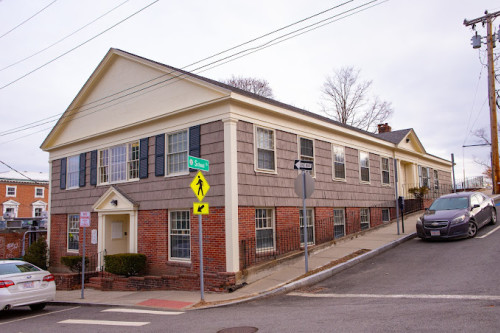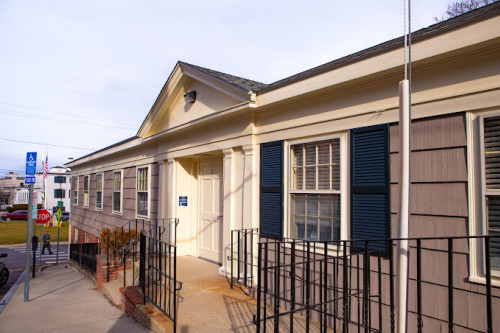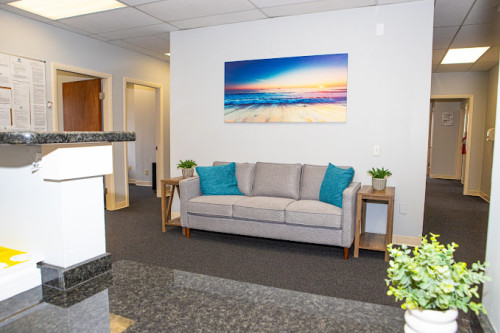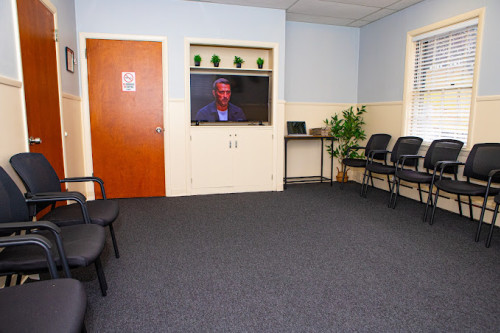






Waterside Recovery Center
Treatment Focus
This center treats substance use disorders and co-occurring mental health conditions. Your treatment plan addresses each condition at once with personalized, compassionate care for comprehensive healing.
Primary Level of Care
Outpatient treatment offers flexible therapeutic and medical care without the need to stay overnight in a hospital or inpatient facility. Some centers off intensive outpatient program (IOP), which falls between inpatient care and traditional outpatient service.
Claimed
Recovery.com has connected directly with this treatment provider to validate the information in their profile.
Treatment Focus
This center treats substance use disorders and co-occurring mental health conditions. Your treatment plan addresses each condition at once with personalized, compassionate care for comprehensive healing.
Primary Level of Care
Outpatient treatment offers flexible therapeutic and medical care without the need to stay overnight in a hospital or inpatient facility. Some centers off intensive outpatient program (IOP), which falls between inpatient care and traditional outpatient service.
Provider's Policy
Your individualized addiction treatment may be available at little to no cost to you. We collaborate with several major insurance companies to ensure that the path to a brighter future is more accessible.
Waterside Recovery Center
Waterside Recovery Center
About Waterside Recovery Center
Waterside Recovery Center is an outpatient program providing a diverse range of services for adults with addiction and co-occurring mental health conditions. They offer 3 programs that vary in intensity: a partial hospitalization program (PHP), an intensive outpatient program (IOP), and an outpatient program (OP). Clients begin their recovery journey with a thorough assessment with a licensed therapist to determine a personally tailored, comprehensive treatment program to fit their individual needs.
Continuum of Care
PHP (also known as day treatment) is the most intensive level of care at Waterside. This program is best suited for clients who require daily therapeutic support without the need for 24-hour supervision. Clients participating in PHP receive daily treatment for several hours per day, multiple days per week, with access to evidence-based methods best suited for their needs. Treatment incorporates a mix of individual counseling with experienced therapists, group therapy sessions fostering peer support and developing coping skills, and holistic therapies such as art therapy, mindfulness, and yoga.
Their IOP (referred to as their afternoon treatment program) is designed for individuals who have already completed a higher level of care or require more flexibility to accommodate daily responsibilities. IOP offers structured sessions multiple times per week consisting of individual and group therapy in addition to life skills training and addressing any needs for ongoing support with compassionate staff members.
Their outpatient program offers support for sustained recovery and caters to individuals who have successfully completed higher levels of care. The outpatient program offers the most flexibility with less frequent individual and group therapy sessions. Clients can focus on strategies to prevent relapses, reinforce skills developed in higher levels of care, and participate in alumni activities and stay connected with peers on similar wellness or recovery journeys.
Waterside Recovery provides progress tracking for every client, monitoring progress throughout the treatment process and adjusting personalized treatment plans as necessary.
Family Involvement
Family involvement is encouraged and recognized at Waterside, with family therapy available to clients and their loved ones who have been impacted by their addiction. Family therapy sessions aim to improve communication, mutual understanding, and healing relationships between family members in a supportive and therapeutic environment.
Center Overview
Treatment Focus
This center treats substance use disorders and co-occurring mental health conditions. Your treatment plan addresses each condition at once with personalized, compassionate care for comprehensive healing.
Insurance Accepted
Cash Pay Rates
Estimated Cash Pay Rate
Center pricing can vary based on program and length of stay. Contact the center for more information. Recovery.com strives for price transparency so you can make an informed decision.
Levels of Care








Your Care Options
Specializations
Day Treatment
In a PHP, patients live at home but follow an intensive schedule of treatment. Most programs require you to be on-site for about 40 hours per week.
Intensive Outpatient Program
In an IOP, patients live at home or a sober living, but attend treatment typically 9-15 hours a week. Most programs include talk therapy, support groups, and other methods.
Outpatient
During outpatient rehab, patients attend a structured treatment program while continuing to live at home.
Who We Treat
Men and Women
Men and women attend treatment for addiction in a co-ed setting, going to therapy groups together to share experiences, struggles, and successes.
Approaches
Evidence-Based
A combination of scientifically rooted therapies and treatments make up evidence-based care, defined by their measured and proven results.
Individual Treatment
Individual care meets the needs of each patient, using personalized treatment to provide them the most relevant care and greatest chance of success.
Personalized Treatment
The specific needs, histories, and conditions of individual patients receive personalized, highly relevant care throughout their recovery journey.
Therapies
1-on-1 Counseling
Patient and therapist meet 1-on-1 to work through difficult emotions and behavioral challenges in a personal, private setting.
Mindfulness Therapy
This ancient practice can be mental, emotional, and even spiritual. In meditation, you focus your attention on the present moment without judgement.
Art Therapy
Visual art invites patients to examine the emotions within their work, focusing on the process of creativity and its gentle therapeutic power.
Family Therapy
Family therapy addresses group dynamics within a family system, with a focus on improving communication and interrupting unhealthy relationship patterns.
Life Skills
Teaching life skills like cooking, cleaning, clear communication, and even basic math provides a strong foundation for continued recovery.
Relapse Prevention Counseling
Relapse prevention counselors teach patients to recognize the signs of relapse and reduce their risk.
Substances We Treat
Alcohol
Using alcohol as a coping mechanism, or drinking excessively throughout the week, signals an alcohol use disorder.
Co-Occurring Disorders
A person with multiple mental health diagnoses, such as addiction and depression, has co-occurring disorders also called dual diagnosis.
Cocaine
Cocaine is a stimulant with euphoric effects. Agitation, muscle ticks, psychosis, and heart issues are common symptoms of cocaine abuse.
Drug Addiction
Drug addiction is the excessive and repetitive use of substances, despite harmful consequences to a person's life, health, and relationships.
Heroin
Heroin is a highly addictive and illegal opioid. It can cause insomnia, collapsed veins, heart issues, and additional mental health issues.
Psychedelics
Hallucinogenic drugs—like LSD—cause euphoria and increased sensory experiences. When abused, they can lead to depression and psychosis.
Methamphetamine
Methamphetamine, or meth, increases energy, agitation, and paranoia. Long-term use can result in severe physical and mental health issues.
Opioids
Opioids produce pain-relief and euphoria, which can lead to addiction. This class of drugs includes prescribed medication and the illegal drug heroin.
Languages
Aftercare
Care Designed for Your Needs
Activities
Yoga
Yoga is both a physical and spiritual practice. It includes a flow of movement, breathing techniques, and meditation.





